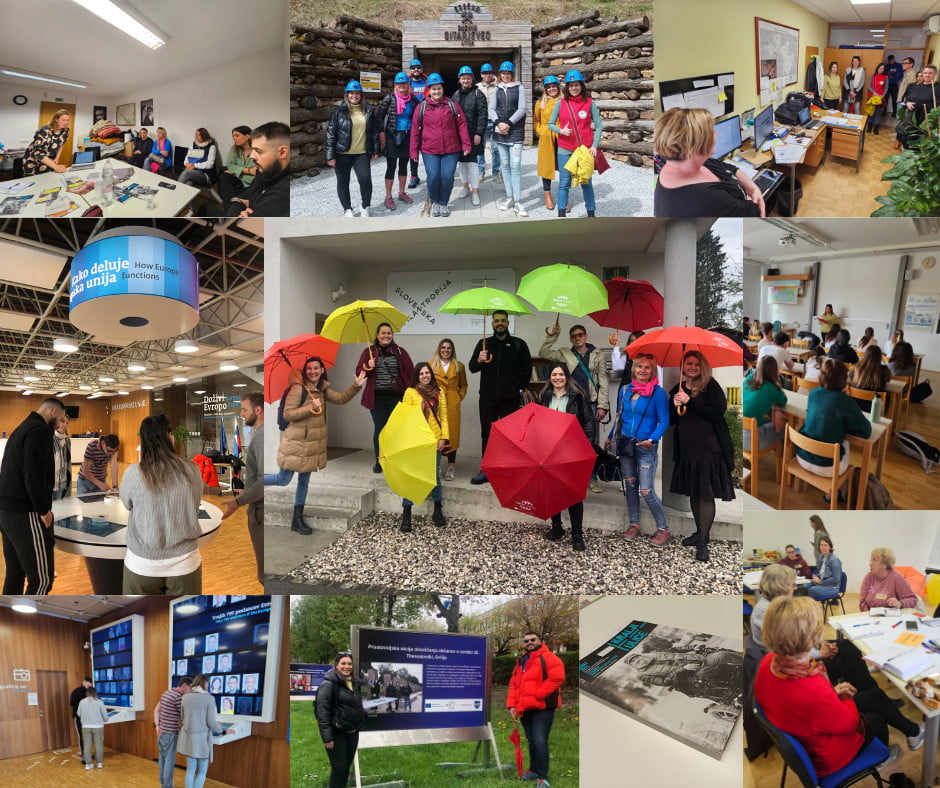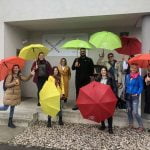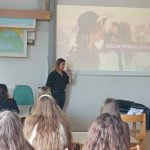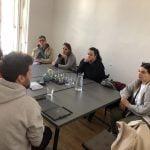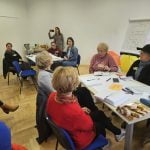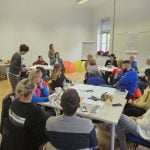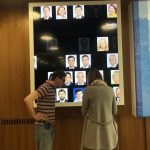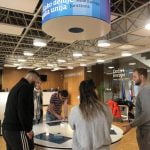In 2021, thirteen European cities joined the ERAS project – the European Alliance for Volunteer Support, united by a common desire to connect citizens and exchange good practices in the field of volunteering. This year, the ERAS alliance continues its work with a new project: ERAS II – lessons from the Covid-19 crisis.
As part of the new project, six partner organizations from Slovenia, Bulgaria, Greece, Hungary, Latvia, and Portugal will research the impact of Covid-19 on volunteering and the support of volunteering by local authorities for a better response to crisis situations. Our partners will research the impact of the Covid-19 pandemic by exchanging good practices, knowledge, and experience at 4 international events.
The first of four international events to strengthen solidarity values and volunteerism in Europe was held in Litija between 23 and 26 April 2023, with a presentation of good practices implemented in the municipalities of Litija and Ljubljana, a consultation with non-governmental organizations on the topic of the development of volunteering and the exhibition Volunteering in the time of Covid-19.
Partners from Bulgaria, Greece, Hungary, and Latvia visited organizations from Ljubljana and Litija and learned about their good practices. We spoke with representatives of the Slovenska filantorpija, Kralji ulice Society and the PIC – Legal Centre for the Protection of Human Rights and the Environment about their work and the volunteer programs they run and how the epidemic affected their work and how they adapted to it so that they will continue to support and develop volunteerism. None of the organisations stopped their volunteer programmes and actions during Covid-19. In fact, they were busier than ever.
Slovenska filantropija, coordinator of the Slovenian network of volunteer organizations, presented their work in the field of volunteering. We learned that, among many activities during the epidemic, they organized transportation for employees of one of Ljubljana’s senior citizen homes during the first lockdown when public transport was stopped. In the second lockdown, they offered the service to three senior citizen homes as well as acted as the reception point for all transportation needs and coordinated transportation with other providers. We were impressed that even though 79 volunteers made 60.000 km in 1.223 hours no infections were recorded.
Kralji ulice Society focused on providing help for vulnerable groups such as the homeless and the Roma community. They drew attention to the consequences of distance education for Roma children, adolescents and families and the development of crisis accommodation for vulnerable groups of the COVID-19 – especially for the needs of isolation in case of infection with Covid-19 for homeless people, people from accommodation programs or housing units, victims of violence or perpetrators of violent acts and large (Roma) families who have no other option of isolation. At the same time, they drew attention to the very problem of the lack and great need for crisis accommodation and accommodation programs in general. During the first wave of the epidemic, they also opened public toilets and thus gave homeless people access to water, toilets, clean clothes, disinfectants, and protective masks.
At PIC – Legal Centre for the Protection of Human Rights and the Environment they strive for effective protection of rights, for promoting the development of legal thought and the search for more advanced, more democratic, and more humane solutions, for strengthening civil dialogue and the position of non-governmental organizations, for involving the public in decision-making processes, and for simpler and more understandable legislation. Their work during the epidemic was largely characterized by the fight against constitutionally contested management of the epidemic by the former government. PIC was one of founding organisations of the Legal Network for the Protection of Democracy that provided legal help to citizens. During this time PIC also participated as co-organizer of the campaign for the referendum on the Water Act. The work in the scope of the campaign largely included volunteers in informing the public and spread of information.
We learned how volunteer projects contribute to the quality of life in the community and how the Municipality of Litija supports the development of volunteerism with projects such as the Point for Seniors and participation in the Sopotniki (Cotravellers) program. Both programs are targeted towards volunteers providing help and support to the elderly. Point for Seniors is an advisory office that provides help and support to the elderly and coordinate the work of volunteers and Sopotniki is a program that provides free transport for the elderly from small, remote villages. Both programs are implemented in cooperation with the neighbouring Municipality of Šmartno pri Litiji. During Covid-19 the 15 volunteers of Sopotniki program from both municipalities did not stop. As more people needed help, they have expanded their services and delivered hot meals to students doing distant learning.
We talked with representatives of non-governmental organizations from the municipality of Litija about the possibilities of further development of volunteerism both at the local and European level.
We visited the EU House and talked with the students of the Litija Secondary School about the European Union and the opportunities it offers to young people. We also opened the first of six photo exhibitions Volunteering in the Time of Covid-19, with which we want to shed light on the work and achievements of volunteers from various European countries, who selflessly contributed to limiting the epidemic and mitigating the consequences it had on everyday life.
As the project continues the photo exhibition will also visit Bulgaria, Greece, Hungary, Latvia, and Portugal.
For more information about the ERAS project, visit
www.consulta.si/eras and www.facebook.com/EuropeanAllianceForVolunteerSupport.
Project European Alliance for Volunteer Support – learnings from Covid-19 crisis (ERAS II) is co-financed by European Union, programme CERV, strand Network of Towns.
